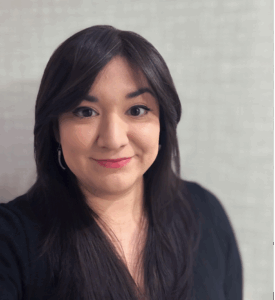
Sarah Montoya is a queer Mexican-American settler working at the intersection of Settler Colonial Studies, Critical Geographies, Feminist Technology Studies, and Critical Information Studies. She earned a Ph.D. in Gender Studies at UCLA. Her dissertation, Electronic Empires and Digital Domains, examines representations and material histories of telecommunications development in the U.S. through the lens of settler colonial studies. The project addresses settler-state investments in telecommunications infrastructure and policy, interrogates settler colonial geographic imaginaries in narratives of digital spaces, and examines settler colonial logics embedded in the code and interface of digital cartographic projects. Additional research interests include histories of scientific racism, critical legal studies, queer and trans of color studies, and abolitionist work.
Act in Solidarity
Decolonization, or the return of land to its Indigenous, ancestral kin and relations, is necessary. Learn more about The Return of Stolen Land to the Wiyot and the Return of Tc’ih-Léh-Dûñ to the InterTribal Sinkyone Wilderness Council. To think about how to negotiate our ongoing occupation of Native land and what settlers can do in solidarity, learn about The Shuumi Land Tax. To learn about the land you occupy, visit the Native Land Digital project. Returning the land and repairing relations is possible.
Mellon Humanities Fellowship, Anza National Historic Trail
Gender Studies, UCLA
English, UTSA
English, Women's Studies, UTSA
Current Work
Sarah is the recipient of a Mellon Humanities Postdoctoral Fellowship on the Juan Bautista de Anza National Historic Trail where she has created training and outreach materials to support engagement with Native nations and tribal communities, including federally recognized and non-federally recognized tribes, along the 1200 mile historic corridor. The position has allowed her to direct material resources towards tribal educational and cultural programming.
Previous Work
At UCLA, Sarah focused on digital mapping and digital explorations of race, space, and the legal system in the US and Canada and developed experience as a curator, researcher, site designer, and programmer on a variety of public humanities projects. She worked with Dr. Mishuana Goeman (Tonawanda Band of Seneca) on Mapping Indigenous LA and Carrying Our Ancestors Home and worked with Dr. Sherene Razack on establishing The Racial Violence Hub and Race and Deaths in Custody.
Before attending UCLA, Sarah received a Bachelor of Arts in Women’s Studies, English, and a Master’s in English from the University of Texas at San Antonio. Her Master’s thesis “Queer (Cyber) Spaces: Representations of Queer Subjectivities in Queer Digital Communities,” examines how online citizenship is shaped through software and site interfaces and how this impacts the staging and (re)presentations of queer identities online. She remains honored to be UTSA’s first Women’s Studies graduate. Her Honor’s Thesis entitled, “’No se raje, Chicanita’: An Exploration of Identity Politics, Social Scripts, and Power Negotiations in Latina Authors’ Youth Literature,” explores Latina-authored youth literature geared towards young Latinas and was specifically attentive to the politics of visual representation in children’s books. The thesis represented UTSA at the 2010 National Collegiate Honors Council’s Portz Scholars Award.